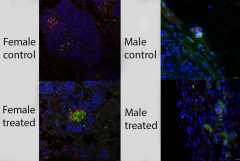Video of Research at Risk: Stopping metastatic cancer
Metastasis. It’s the word cancer patients dread most – and the scan with ominous black spots showing the disease has spread. For too many people, metastatic cancer is kept at bay only for a short time, with chemotherapy and radiation, before the disease returns or the harsh treatments fatally weaken the body.
For more than 20 years, Dr. Nancy Du, associate professor of pathology and laboratory medicine and the Rasweiler Family Research Scholar in Cancer Research at Weill Cornell Medicine, has researched how metastatic cancer arises. With a $500,000 grant over three years from the Congressionally Directed Medical Research Programs at the U.S. Department of Defense (DoD), she was poised to study how to prevent cancer from spreading to the bones of patients with estrogen receptor-positive breast cancer.
“The first line of treatment for this type of cancer is endocrine therapy; but soon after treatment, the cancer becomes resistant to treatment,” she said. “So, we are trying to determine what makes the cells stop responding. We have a clue, and we are testing our hypothesis to develop a better treatment plan for these patients.”
Du had recently begun the research when she received a stop-work order from the DoD in April.







